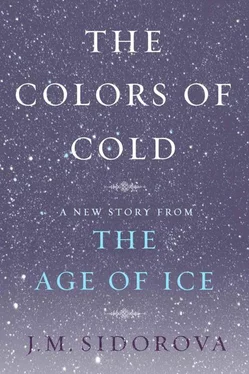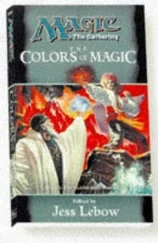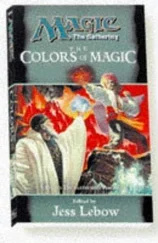“It needn’t be elaborate,” I improvised feverishly. “Just come out at night. Through the kitchen door. At two in the morning. I’ll be waiting. Every night for a week starting tomorrow I’ll be waiting unless I hear from you otherwise. We needn’t much time, we needn’t even go anywhere from your door.”
Oh, I was flying. Inflated and carried away, as if she’d already agreed.
“We will… right there?” she puzzled, and I was nodding, oh yes ! I needed but little, only a tip of the iceberg that was intercourse. I wished I could say so!
“Shh,” she said, “my mother is here.”
The matriarch Countess Tolstoy had run out of flowers to inspect. “Mother”—Marie was all blushing cheeks, wayward eyes, and shrill voice—“Prince Alexander asked me to marry him.”
“Oh, did he?” The matron feigned surprise. “My dearest children—”
“—and I told him I’ll give him my answer in a week.” Marie tried so hard to look willful and sophisticated but she lacked the practice; she awed me nonetheless, my dear beloved. She fumbled and fled into the arms of her mother, the latter now surprised in earnest. “Oh, did you?”
Misplaced like a milepost in an open field, I stood as, safe at her mother’s bosom, Marie turned back to me. “I trust you will wait for my answer,” she said and gave me her—only slightly trembling—fingertips to squeeze in a good-bye.
Of course! She had to be inviting me to be there, by her kitchen door, every night starting tomorrow! “I will be waiting,” I said.
She led her mother away, and the moment they turned the corner, my confidence waned. I spent the next twenty-four hours in remorse, doubting Marie’s meaning and questioning the asinine plan that I had conjured on the spur of the moment.
* * *
St. Petersburg in the 1760s was much different than it is now. It was a city cut out generously, for growth, and it had not yet filled its own interstitial spaces. It lay like a fanciful appliqué on the burlap of my country’s reality. One could be disturbed by its contrasts if one wasn’t so used to them: gilded carriages that bounced over rutted dirt roads, baroque palaces that stood amidst empty fields, wolf-hunting that was best just a few miles away from the assiduously manicured Italian Gardens.
There was a veritable prairie land behind the Admiralty, all the way to the Moika River, where the Tolstoy mansion stood on the east bank, and beyond it. There were timber warehouses facing the mansion over the Moika, and dogs howled there at night. If the wind blew from the west, it smelled of tar from the Admiralty’s shipyard; if from the east, of cowherds. The grass was so tall and coarse next to the Tolstoy stables, it pricked me in the eye, where I sat. Fleas jumped in that grass, mosquitoes buzzed, and vermin scurried about. Well before sunrise, beggars with branded foreheads and ripped-out nostrils gathered nearby, waiting for the snobbish household serf-man to come out and give away scraps from the Tolstoys’ generous kitchen.
It was, in other words, a highly unsuitable place for a delicate young lady to come out to at night.
For five nights I waited for her in vain. On the sixth night the door opened and she slipped out. I emerged from my hiding spot in the grass. She grabbed the door handle, ready to flee, then saw it was me. She tiptoed over. A nightcap, a house frock, and a sleeping gown. Slippers on bare feet. “Here I am,” she whispered.
For a while we stood close, not a hand’s width between us, and stared at each other. Then she shut her eyes with the kind of sacrificial abandon that should have struck the longest, saddest chord out of my soul, had I not been so taken with thrill and passion.
I lifted her and curled her in the crook of my arm the way I’d dreamed of, and knelt in the grass, she in my lap, and I kissed her cheeks, and lips, and shoulder—somehow bared—and then a bare knee, and neck, and chin, and lips again.
I kissed her until I suddenly tasted salt and saw, in a breathtaking close-up, a long tear-track glistening on her cheek. The tear escaped her eye no matter how tightly she squeezed it shut. The next instant I noticed how stiff she felt in my arms. And then I pulled back and saw her as she was, so brave, so determined, fighting shivers, squeezing all of herself so tight—those little white fists held aloft… And still unwilling to open her eyes, still hoping, she whispered, “No, don’t stop! I’ll be all right, it’s just me, it’ll go away. Please don’t let go of me!”
But let go I did. “What,” I said, deadening, “ is it?”
She scrambled off my lap. She tried to speak but sobbed instead; she shivered and tugged at her nightgown. The kitchen door behind us opened, a gaggle of lanterns spilled out. “Young mistress! Young mistress Maria Vassilievna, where are you?!”
Marie was backing away from me. “It was… it was—”
Led by the matron Tolstoy, the search party was closing in; Marie turned and faced them, wailing like a child. “I sleepwalked! Mama, I’m so scared! I’m cold, Mama!”
They surrounded her, swept her indoors. No one ever saw me.
* * *
There is a Russian fairy tale about Old Man Frost, the ruler of winter. He roamed the wildest reaches of the land, he raged in snowstorms, and come morning, he stood amidst his snowy desolation. A sorceress once saw him standing like that, and pitied his loneliness. She made him a lovely daughter out of snow. When spring came, the snow maiden was meandering through the forest and became entranced by a delightful tune played on a flute. The flutist was a handsome lad and she fell in love with him. Yet soon she realized how many obstacles were in the way of her love: he lived in a village and she hid in the forest; she was pale and shy, while he was courted by many a rosy-cheeked lass. Only once did she dare to show herself to him, yet he took interest and invited her to a village festival. There was a big bonfire, and lads and lasses were jumping over it to show off; the flutist dared the snow maiden to jump with him. She knew she shouldn’t but she was determined to prove her love for him. She jumped, and in an instant she evaporated in a cloud of steam.
With us, the parts were reversed, and so were the elements of nature. The trial was not by fire—it was quite the opposite. Not two days after our transgression, pneumonia struck Marie and brought her to the brink of death. Only in October had she convalesced enough to take my visit. She was swathed in blankets in a rocking chair by a fireplace when they ushered me in and left us alone. I knelt beside her. The fire pushed waves of heat onto me.
“You.” She touched the lapels of my jacket. Then, “We are not going to marry, are we?”
“No,” I said.
“I’m sorry. I must be frail. The doctor says my constitution—”
“You are perfect. Kind. Brave. The cause lies with me.”
“What is it?”
“I don’t know. What… did you feel?”
She gazed into the fire. “ Cold, ” she said.
* * *
She was a gift of the heavens, and I did not deserve her.
That day Marie asked me henceforth to avoid her company, and I obliged. In a year she was seen with suitors; I could not blame her but suffered afresh nonetheless, not least because Andrei was getting married! Heartbroken was a medical diagnosis back then but it did not begin to describe the mix of envy and bile that flooded me when I stood at my brother’s wedding. Was my brother not cursed, after all? Was it just me? Or was Andrei’s bride, this Anna something or other, an unremarkable, demure girl I barely looked at before the ceremony, somehow more accommodating ? Or did she, poor thing, not know what she was getting into?
Читать дальше












